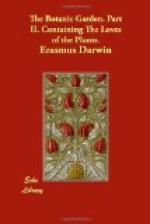Bright
as the blush of rising morn, and warms
The
dull cold eye of Midnight with her charms.
There
to the skies she lifts her pencill’d brows,
20 Opes her fair lips, and breathes her virgin
vows;
Eyes
the white zenyth; counts the suns, that roll
Their
distant fires, and blaze around the Pole;
Or
marks where Jove directs his glittering car
O’er
Heaven’s blue vault,—Herself a brighter
star.
25 —There as soft Zephyrs sweep with
pausing airs
Thy
snowy neck, and part thy shadowy hairs,
Sweet
Maid of Night! to Cynthia’s sober beams
Glows
thy warm cheek, thy polish’d bosom gleams.
In
crowds around thee gaze the admiring swains,
30 And guard in silence the enchanted plains;
Drop
the still tear, or breathe the impassion’d sigh,
And
drink inebriate rapture from thine eye.
Thus,
when old Needwood’s hoary scenes the Night
Paints
with blue shadow, and with milky light;
35 Where MUNDY pour’d, the listening nymphs
among,
Loud
to the echoing vales his parting song;
With
measured step the Fairy Sovereign treads,
Shakes
her high plume, and glitters o’er the meads;
Round
each green holly leads her sportive train,
40 And little footsteps mark the circled plain;
Each
haunted rill with silver voices rings,
And
Night’s sweet bird in livelier accents sings.
Ere
the bright star, which leads the morning sky,
Hangs
o’er the blushing east his diamond eye,
45 The chaste TROPAEO leaves her secret bed;
A
saint-like glory trembles round her head;
[_ Where Mundy._ l. 35. Alluding to an unpublished poem by F. N. Mundy, Esq. on his leaving Needwood-Forest.
Tropaeolum. l. 45. Majus. Garden Nasturtion, or greater Indian cress. Eight males, one female. Miss E. C. Linneus first observed the Tropaeolum Majus to emit sparks or flashes in the mornings before sun-rise, during the months of June or July, and also during the twilight in the evening, but not after total darkness came on; these singular scintillations were shewn to her father and other philosophers; and Mr. Wilcke, a celebrated electrician, believed them to be electric. Lin. Spec. Plantar. p. 490. Swedish Acts for the year 1762. Pulteney’s View of Linneus, p. 220. Nor is this more wonderful than that the electric eel and torpedo should give voluntary shocks of electricity; and in this plant perhaps, as in those animals, it may be a mode of defence, by which it harrasses or destroys the night-flying insects which infest it; and probably it may emit the same sparks during the day, which must be then invisible. This curious subject deserves further investigation. See Dictamnus. The ceasing to shine of this plant after twilight might induce one to conceive, that it absorbed and




